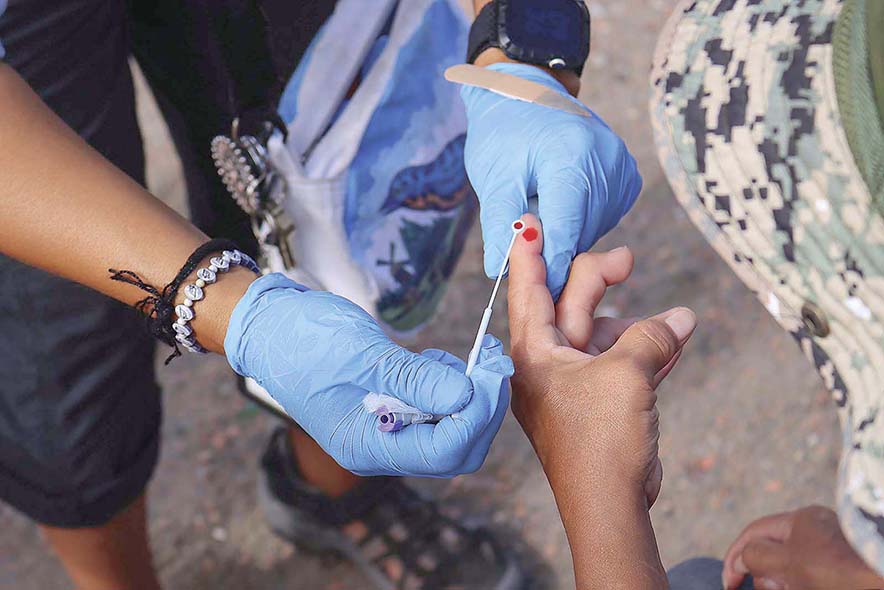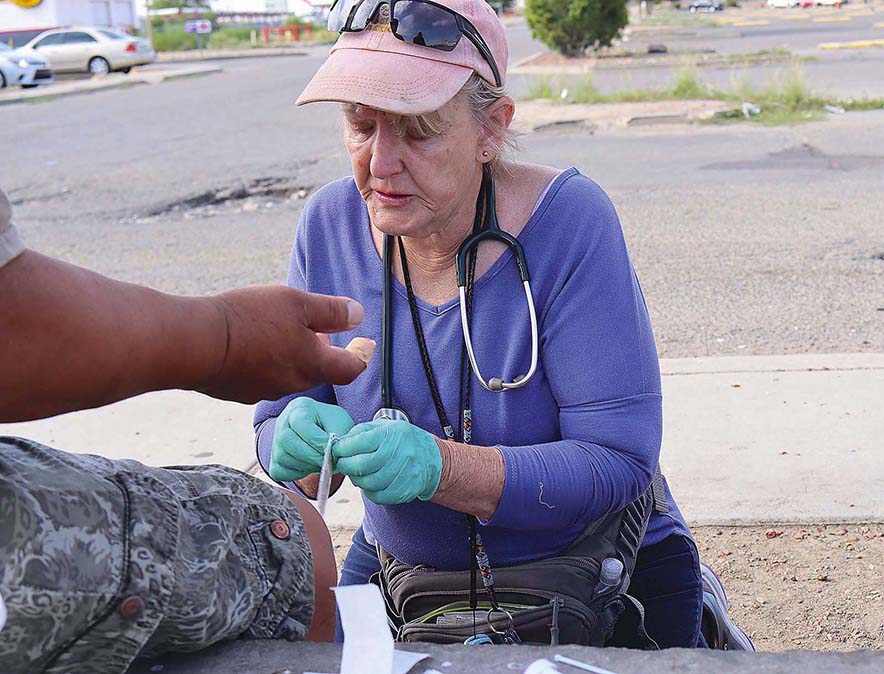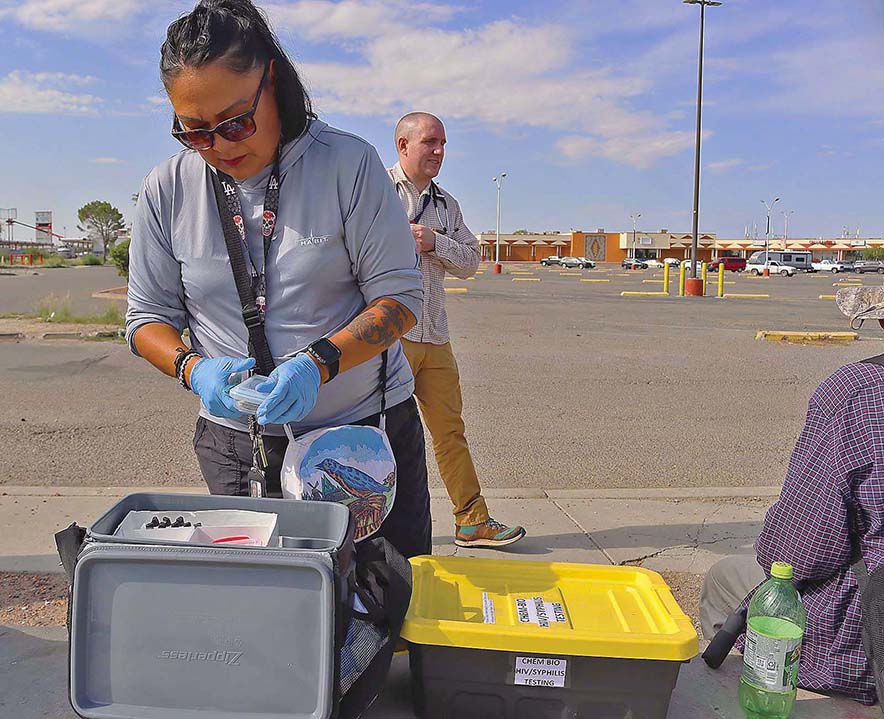
Northern Navajo Medical Center street medicine team aims to prevent syphilis cases

Navajo Times | Boderra Joe
A Sih Hasin Street Medicine team member pricks a patient’s finger to drop blood for a rapid test for syphilis and HIV, which results take less than 20 minutes.
SHIPROCK – Every Tuesday and Wednesday, the Northern Navajo Medical Center’s Public Health Nursing and Sih Hasin Street Medicine teams load their white Ford transit van full of rapid tests, penicillin, wound care, food, water, socks, feminine hygiene products, condoms, medicine, and other necessities to test and treat relatives experiencing homelessness for syphilis and other sexually transmitted infections in the northern parts of New Mexico.

Navajo Times | Boderra Joe
Dr. Ann Vaughn, a family medicine physician of the community medicine team with the Community Health Division at Northern Navajo Medical Center in Shiprock, performs a rapid test for syphilis in a parking lot last Tuesday morning. Vaughn is one of many for the hospital’s Sih Hasin Street Medicine team that travels to various locations to provide testing and treatment for syphilis and other STIs.
“Our team of medical providers, RNs (registered nurses), mental health specialists, health techs, and drivers has been able to find and treat many people who tested positive but did not come back for treatment,” said one representative of the Sih Hasin Street Medicine team last Tuesday in Shiprock.
The street medicine team provides rapid testing for syphilis and HIV, which takes roughly 15 minutes by using a fingerstick and one drop of blood, like checking blood sugar.
“We have results for syphilis and HIV in less than 20 minutes,” said Dr. Chris Percy, the director of the Community Health Division at NNMC.
Rapid testing is offered during street medicine clinics at Northern Navajo Medical Center, and community screening events like Just Move It.
The street medicine team is one of a few in the area that are actively addressing the syphilis and other STIs epidemic by providing testing, treatment, and follow-ups to relatives in the Shiprock and Farmington areas, and in Cortez, Colorado.
Syphilis stats
The Sih Hasin Street Medicine team provides syphilis and STI screening with rapid testing, collects blood and urine for full STI testing, and gives treatment right away for positive tests.
The full street medicine team travels to Shiprock and Cortez on Tuesdays and Wednesdays to provide these services.
This year roughly 60 people per month are testing positive for syphilis, with about 35 of those being brand new cases, according to a Northern Navajo Medical Center report provided to the Navajo Times.
In the Shiprock Service Unit last year, 646 people tested positive for syphilis, with 361 of those being new cases.
Over the past four years, Shiprock Service Unit numbers have gone up from 187 cases in 2020; 292 in 2021; 432 in 2022; and 646 in 2023.
As New Mexico is currently ranked number one in the nation for congenital syphilis rates and two for primary and secondary syphilis rates, the impact on Native Americans and Alaska Natives has been drastic, said Kori VanDerGeest, an epidemiologist at the Albuquerque Area Southwest Tribal Epidemiology Center with the Albuquerque Area Indian Health Board Inc. in Albuquerque.
According to VanDerGeest, the spike in syphilis cases likely rose due to insufficient testing and treatment, especially during COVID-19 response efforts.
Still, Native Americans and Alaska Natives are at greater risk of syphilis and STIs, especially congenital syphilis among pregnant women, which is syphilis that occurs when a mother with untreated syphilis passes the infection to her baby during pregnancy or at birth, according to Centers for Disease Control and Prevention.
But, according to the street medicine team and VanDerGeest, unsheltered relatives face many barriers to syphilis testing and treatment.
Addressing stigma
For example, Kori VanDerGeest said most times unsheltered folks may not have health insurance or the means to travel to a clinic.
Other factors are the trauma and stigma in healthcare facilities which may be reticent to receive medical care.
Additionally, substance use in the U.S. is likely to contribute to the increase of syphilis, as substance use is associated with risky behaviors such as sex without a condom.
But how are healthcare facilities and providers addressing the stigma associated with testing and treatment?
Stigma around STIs and sex in general are deeply rooted in culture, religion, and politics, said VanDerGeest. Stigma can lead to fear, anxiety, depression, and a delay in testing and treatment that individuals face when it comes to their well-being.
The use of language and how to approach it plays a role in talking about STIs. VanDerGeest suggests that individuals can say “My test result was negative,” instead of saying, “I’m clean.” One can also say, “He was diagnosed with syphilis,” rather than, “he’s infected.”
The way one approaches talks of syphilis and STIs in an educated way, oftentimes, allows individuals to become aware and want to get tested.
“We’re just trying to de-stigmatize it,” said Dr. Ann Vaughn, a family medicine physician of the community medicine team with the Community Health Division at Northern Navajo Medical Center.
The initiative effort is to work together to provide testing, treatment, and follow-up for hundreds of people each month, said Vaughn.
But database sharing is tedious, too, especially with data sovereignty for tribes.
Database sharing
“Data sharing is critical to prevent, diagnose, and treat syphilis cases,” said Kori VanDerGeest. “When a person has a reactive syphilis test result, a cascade of activities is needed to cure the person from syphilis.”
First, a confirmatory test is needed, and based on the stage of syphilis, which has four stages: primary, secondary, latent, and tertiary – one to three shots of penicillin G benzathine is needed.
“Over the course of treatment, additional laboratory tests are conducted to monitor disease activity and treatment response,” VanDerGeest said.
She added that tracking these activities is essential to ensure successful treatment.
On a few occasions, the Sih Hasin Street Medicine team members said they had faced obstacles where one person would test positive and begin treatment. But after their upcoming third dose, they would be nowhere to be seen, which caused a delay in their treatment, having to restart their treatment.
“A person with syphilis may not go to one clinic exclusively, especially if they have concerns about confidentiality or don’t have secure housing,” said VanDerGeest.
This results in a lack of interoperability among electronic health records and other data systems operated by the Indian Health Services, tribal and urban Indian health facilities, other federally qualified health care centers, private health care facilities, and the New Mexico Department of Health.
She echoed that there are other forms of data sharing among these entities that are limited and those that do exist are commonly fragmented and do not occur in real-time.
It is why VanDerGeest advocates that syphilis data needs to be timely, accessible, and tribe-specific so that tribal leaders can respond swiftly and appropriately to syphilis outbreaks.
According to public health nurse Eugenia Johnson, with Northern Navajo Medical Center, who also serves as the STI nurse and Sih Hasin Street Medicine nurse, said in her two years leading efforts with the STI crisis, it’s a tough battle as she has encountered many people across various communities and the surrounding states.
With unsheltered relatives, it is hard to keep track as most of them migrate from one area to another or are not seen for a few weeks.
This halters treatment for those who tested positive for syphilis, other STIs, or HIV, which could cause more positive cases if left untreated, Johnson said.
However, Dr. Ann Vaughn, a family medicine physician of the community medicine team with the Community Health Division at NNMC, reminds people that syphilis, like other STIs, is curable, except for HIV and herpes.
Being part of the street medicine team, Vaughn believes the need and want to treat patients as their well-being is her priority. She highly recommends individuals get tested because most syphilis and STI cases are asymptomatic with no signs or symptoms of infections.
Uprise in syphilis
The severe uprise in syphilis and other STI cases had reached a 70-year high in 2022, according to the CDC.
As the Navajo Nation expands across New Mexico, Arizona, and parts of Utah – which are among the nation’s highest infection rates in the Southwest region, according to Eugenia Johnson.

Navajo Times | Boderra Joe
Eugenia Johnson, a public health nurse, STI nurse, and the Sih Hasin Street Medicine nurse at Northern Navajo Medical Center, prepares a rapid test for syphilis/HIV for “friends” as they refer to unsheltered relatives in the Shiprock area last Tuesday morning.
The need for testing and treating is the sole purpose of the Sih Hasin Street Medicine team to tackle and lower the cases within Shiprock and surrounding areas.
In 2021, the Northern Navajo Medical Center launched its Sih Hasin Street Medicine, which initially began with efforts by Dr. Chris Percy; Dr. Asha Atwell, an emergency physician with the Department of Health Promotion and Disease Prevention at NNMC, and Aimee McGilbert, a public health nurse and a former EMT at NNMC, initiated the street medicine to ensure unsheltered population was being cared for.
According to World Health Organization, syphilis is a curable bacterial sexually transmitted infection during sexual contact through vaginal, anal, and oral sex without a condom with a partner who has syphilis or other STIs. Untreated congenital syphilis can cause bone deformities, severe anemia, jaundice, meningitis, stillbirth, and infant deaths.
Additionally, untreated syphilis can cause serious health problems – damage to the heart, blood vessels, brain, nerves, eyes, and ears; many years after they are first infected.
Any stage of syphilis goes through four stages: primary, secondary, latent, and tertiary, and is treated and cured with shots of penicillin.
The primary stage is one or more painless sores at the site where syphilis first entered the body, which could go away but does not mean the infection has gone away as the syphilis germ hides inside a person’s body; the secondary is a noticeable red or reddish-brown rash and can have other general symptoms like fever, sore throat, swollen lymph nodes, or fatigue. Untreated, most people do not notice any symptoms and the infection moves on to the next stage; latent syphilis can stay in a person’s body for years without any signs or symptoms; and tertiary, which most people with untreated syphilis will not get to tertiary stage but could develop serious damage affecting the heart, brain, and nerves, according to NNMC.
The street medicine team is seeing positive syphilis cases in patients from 15 to 75 years old and in all gender groups and advises that the only way to avoid STIs is not having vaginal, anal, or oral sex.
But the street medicine team suggests that those sexually active can follow certain measures to prevent syphilis and STIs: be in a long-term mutually monogamous relationship with a partner who has been tested and does not have syphilis and use condoms the right way because condoms prevent the spread of syphilis and other STIs.
Preventing
During the syphilis and STIs epidemic, screening for syphilis is recommended yearly for people ages 13-65 years old, according to the Northern Navajo Medical Center.
When Tuesdays and Wednesdays arrive, it’s the busiest day for the Sih Hasin Street Medicine team.
When out in the field, the street medicine team spoke about how they arrive at locations and approach “friends,” which they call unsheltered relatives, to present why they are there and provide education on STIs.
At first, when approaching friends, the street medicine team would ask the friends if they knew what syphilis is and ask if they would like to get tested.
Oftentimes, they are unaware of what syphilis is, so the street medicine team does their best to best explain it.
Upon testing, the team spoke about reactions when one tests positive for syphilis, they become upset and angry, whereas some are accepting of the diagnosis and prefer treatment.
The street medicine team provides STI education and strives to inform its patients that this is a treatable condition if they are willing to comply with the full treatment course.
Johnson said that elders can test positive for syphilis if it was untreated for many years as the infection could stay in a person’s body for years without any signs or symptoms, which is called latent.
Patients could now get tested for syphilis and other STIs without having to see a provider by going directly to the Northern Navajo Medical Center laboratory and requesting the Express STI testing, which allows a confidential result in two to three days, Johnson said.
When it comes to the street medicine team visiting community sites, unsheltered relatives are willing to get tested.
A few times, they refuse, which the street medicine team respects and offers the individual water, food, socks, feminine products, condoms, COVID-testing, canes, wound care, and other necessary needs.
It is hard, shared Johnson, but after two years of leading efforts, she has become comfortable with how to engage with the community to ensure they are taken care of.
Orchestrating efforts
Although syphilis cases across the U.S., especially among Native Americans and Alaska Natives are very high, the Northern Navajo Medical Center’s Public Health Nursing and the Sih Hasin Street Medicine teams continue to prevent cases within its region.
According to Dr. Ann Vaughn, efforts in visiting people’s homes or community sites throughout the Shiprock area and surrounding regions, she believes all deserve primary care when it comes to basic health needs.
It provides a sense of relief, Eugenia Johnson said, when it comes to the willingness of those to be tested.
Continued initiatives move forward as NNMC coordinates its syphilis and STI response with its partners from the Navajo Nation’s Social Hygiene Program and the states of New Mexico, Arizona, and Utah, according to Dr. Chris Percy.
With community engagement and to prevent additional syphilis and other STI cases, the street medicine team provides free condoms at various locations, stocks free condom dispensers in multiple public bathrooms, and provides condoms in the community at chapter houses, and several area gas stations.
Additionally, those who want to get tested for STIs but would rather do it in the privacy of their own homes, can order a free, mailed STI/HIV test kit from the “I Want the Kit” website.
To further tackle the syphilis and congenital syphilis outbreak among tribal citizens, the U.S. Department of Health and Human Services with the Office of the Assistant Secretary for Health will hold a tribal consultation on Aug. 5 to discuss the epidemic with tribal leaders.
“HHS is committed to addressing the escalating cases of syphilis and congenital syphilis through the establishment of the National Syphilis and Congenital Syphilis Syndemic Federal Task Force (Task Force),” the release states.
The Task Force is a cross-agency collaborative effort with participants from the U.S. health and human services agencies and offices, including the IHS, as well as the U.S. Department of Agriculture, the U.S. Department of Justice; the U.S. Department of Veterans Affairs, and the White House, including both the Office of National Drug Control Policy and the Office of National AIDS Policy, the release states.








 Highway 264,
Highway 264, I-40, WB @ Winslow
I-40, WB @ Winslow